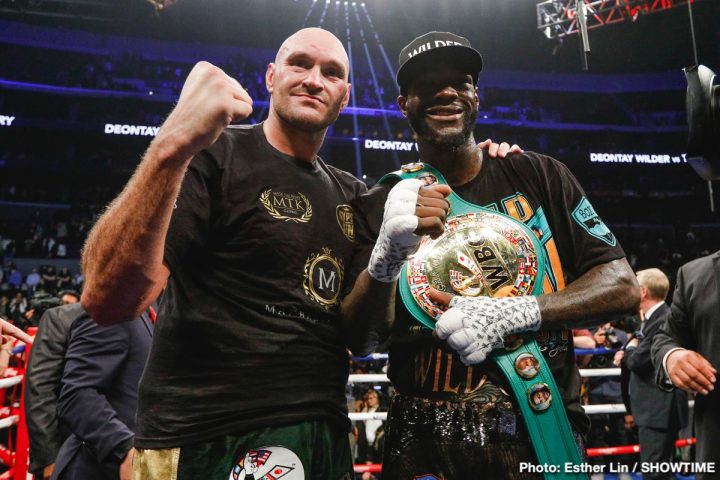“I want it all and I want it now.” Those lyrics by the rock group Queen describe the sentiments of boxing fans perfectly. With lack of institutional control and pre-made schedules (as opposed to leagues such as the National Football League or the Premier League), each time a bout is announced that does not match the perceived best fighters, that announcement causes a massive letdown among fans.
Whether the reason is “ducking”, “marinating”, or promotional ties, the result is often the same. A bout nobody would have chosen takes place, and another six months is spent to ponder when the fight that really matters will happen. That appears to be the case of the much-anticipated rematch between heavyweights Deontay Wilder and Tyson Fury. Although it is a disappointment, it is far from tragic. The undesired wait by the fans will most likely be rewarded in the future.
Rematches do not have to be immediate to hold importance. If the fighters are good enough to navigate the minefield of their division, they will benefit professionally from the experience they gain. If they are impressive in doing so, their paydays will grow as well. Muhammad Ali lost to Joe Frazier in 1971. Three years and 13 fights later (an unrealistic number for this era), Ali avenged his loss in front of an estimated 200 million viewers. Evander Holyfield lost his title to Riddick Bowe in November 1992, fought Alex Stewart, then regained his title in the 1993 rematch. Bowe himself had two fights before the rematch as well. Although the interim bouts may not have been as mouthwatering or historically significant as the rematches, they added value to the final product. Instead of being oversaturated by another three to six months of marketing the exact same bout, the fans and participants were able to take a short break, enjoy some entertaining bouts during the gap, and fully embrace the rematches.
The break between bouts will give the fighters more time to prepare. Fury is still only about a year removed from weighing close to 400 pounds. The additional time will allow him to improve his fitness and knock off more ring rust when he takes on his next opponent. Wilder will be more prepared as well. This was his first time in the ring with a world class boxer (the jury is still out on Luis Ortiz), and any nuances, tricks, or traps that he can integrate into his game will ensure that Fury will have to be better to beat the improved version of Wilder. He can work on these tactics in his next bout, which will make him more dangerous and also give Fury more wrinkles to be prepared for in the return bout. A better Fury and a better Wilder make for a better product.
The time off can also allow for other threats to the heavyweight kings to rise. In an ideal world, Fury would fight Wilder, with the winner fighting Anthony Joshua six months later. If this were to occur, and the winner won in convincing fashion, who next for the winner? Has Dillian Whyte, Jarrell Miller, or Luis Ortiz done enough to warrant the patrons of the sport chanting their name as the next man up? Will Alexander Povetkin, Joseph Parker, or Kubrat Pulev be thought of as worthy challengers? No creditable contender would have the time to both stake their claim and convince the populace of their merit. The legend of George Foreman grew between Ali-Frazier and the rematch. His was fresh blood putting his stamp on the sport, which included the thrashing of Frazier. By the time Ali and Frazier had their rematch, they both knew that there was a monster awaiting them. Nine months after Ali defeated Frazier in the second bout, he slayed the beast in the “Rumble in the Jungle” witnessed by an estimated 1 billion viewers. That is billion with a “B”.
Maybe the rematch is later this year. Maybe it is in 2020. If they continue to win, they will eventually meet. If one or both lose, they were not the fighters many believed them to be, and as such will not have earned the lucrative rewards of a rematch. What is just as important to the heavyweight division is that those who wish to be at the forefront to challenge for the title truly earn the opportunity. This year may bring Joshua-Miller, Wilder-Breazeale, and Fury-Pulev. It also needs to deliver a combination of the other named heavies fighting each other so that while the division bides its time, it is not wasting its time. The economics dictate that somehow, someway, sometime, Fury/Joshua/Wilder will take place. But afterward, there needs to be another heavyweight ready to ascend. And that can only take place with some time. The wait will be inconvenient, but in the end will be rewarded.
